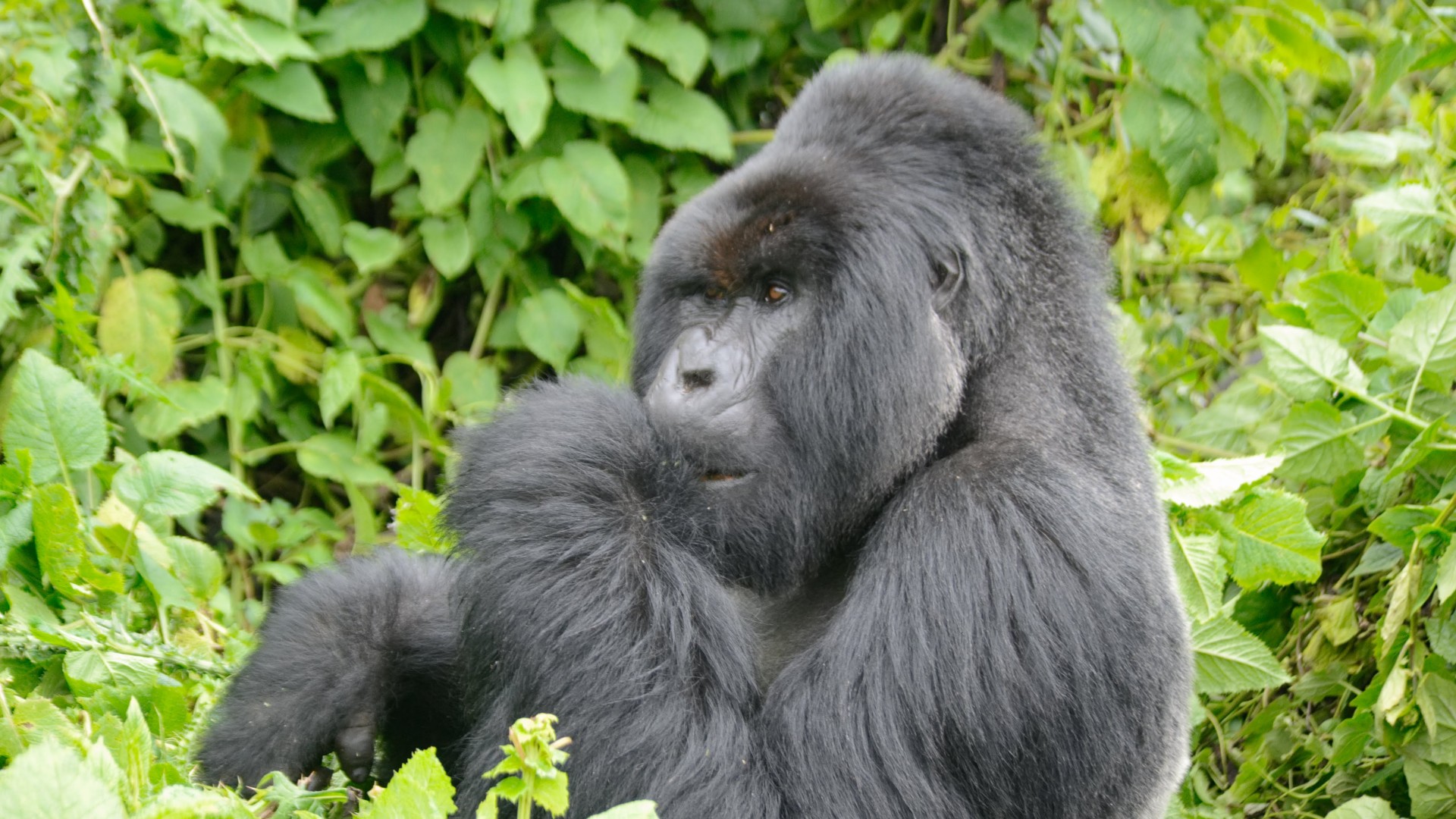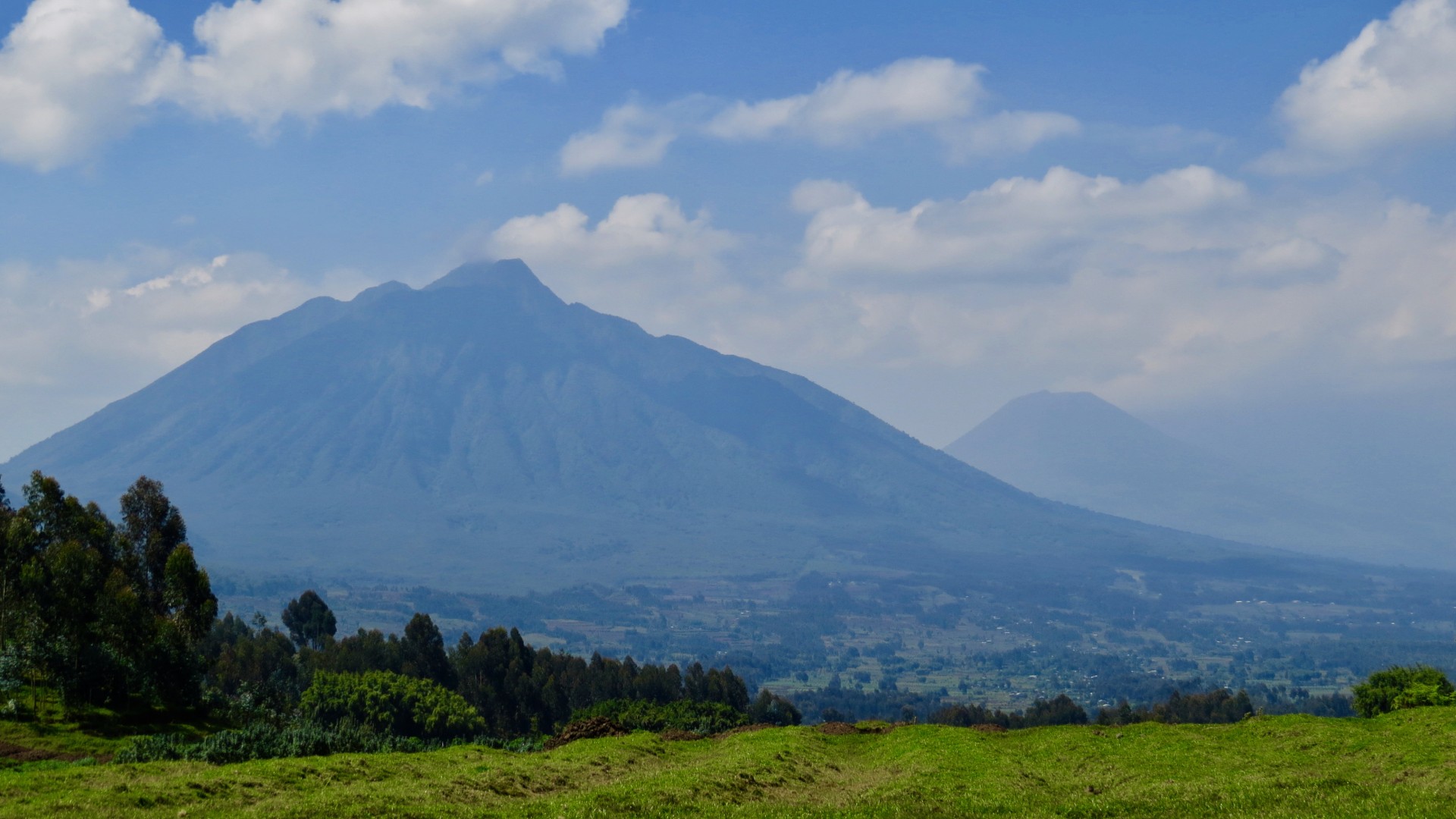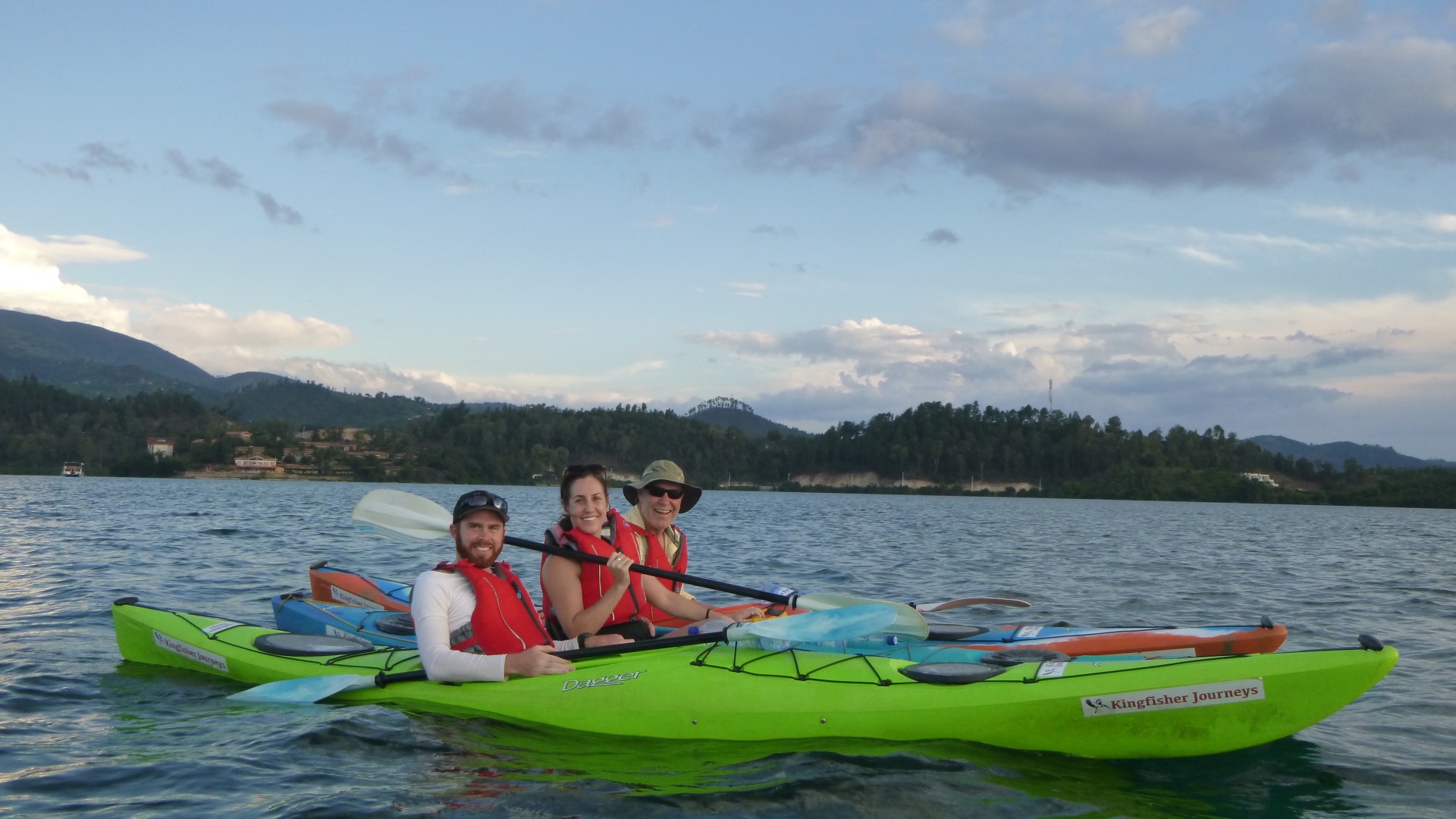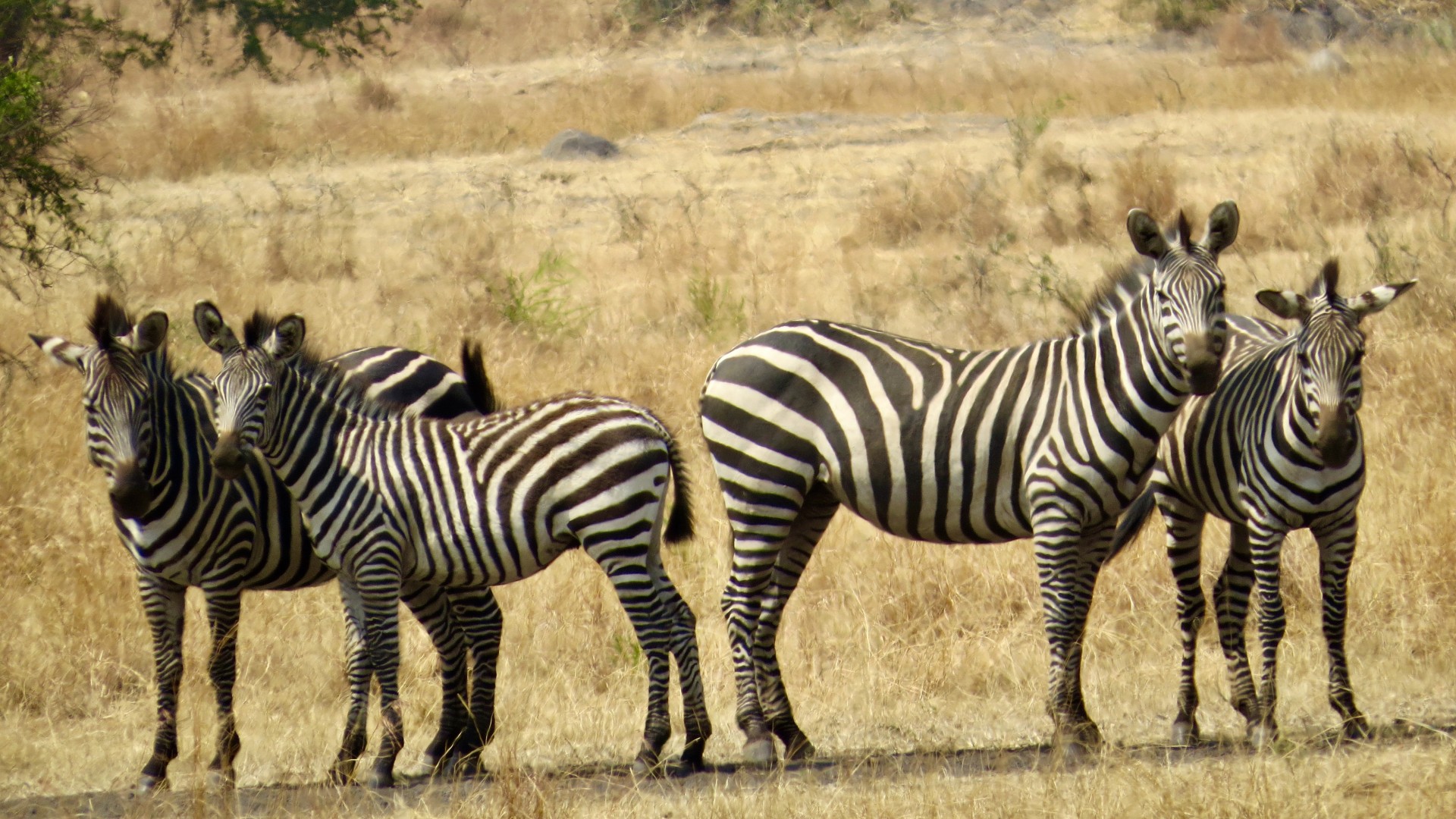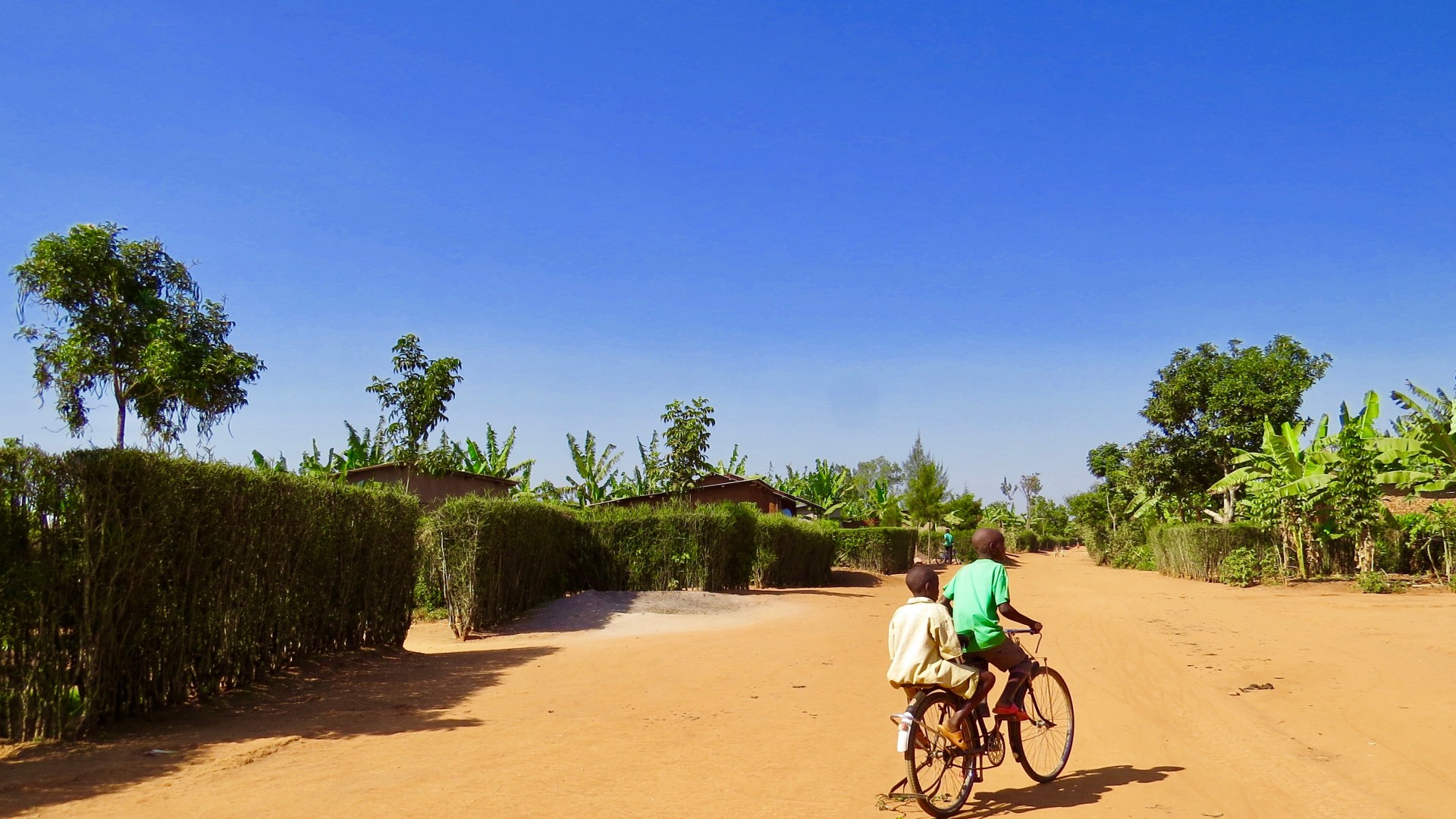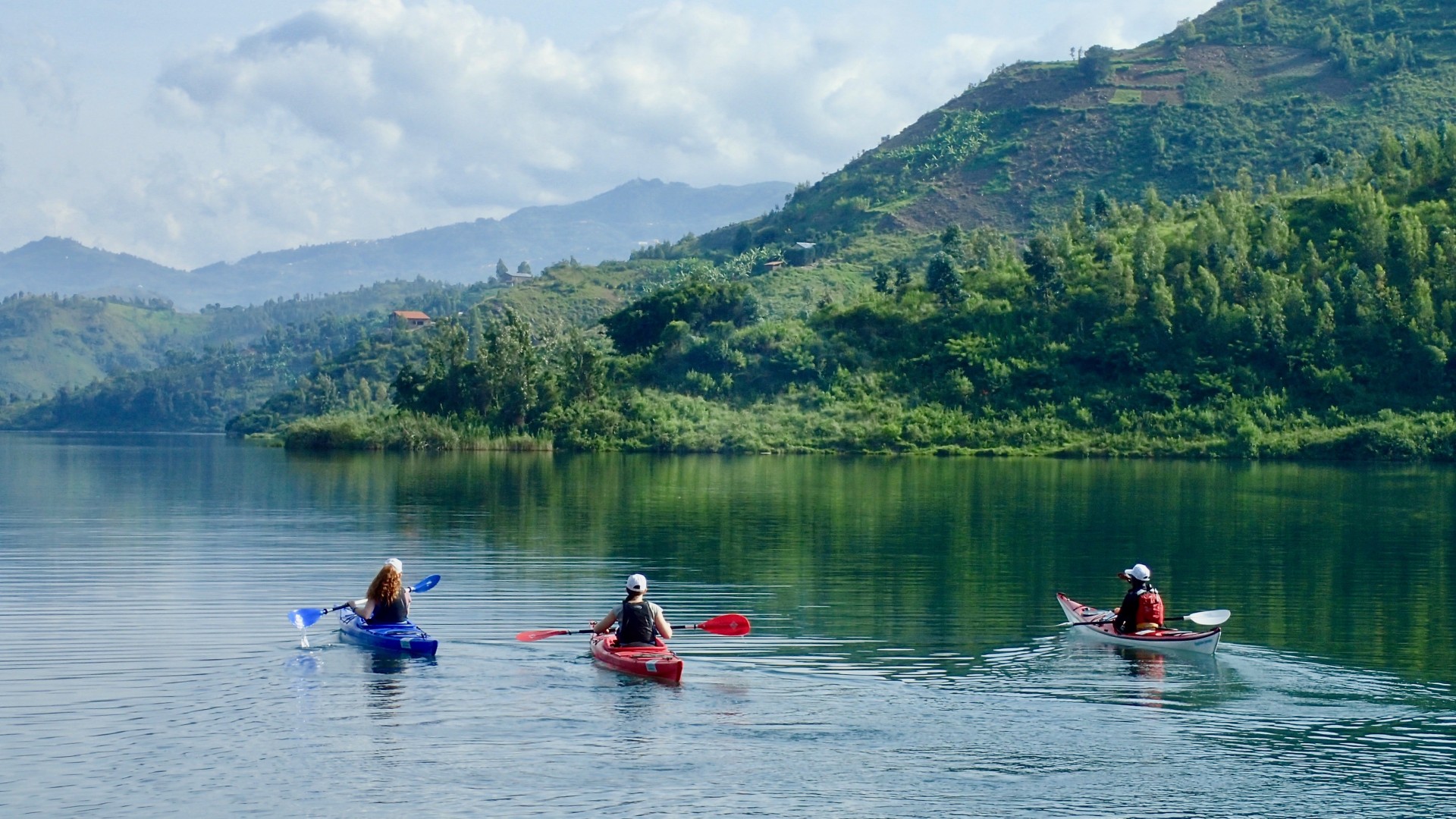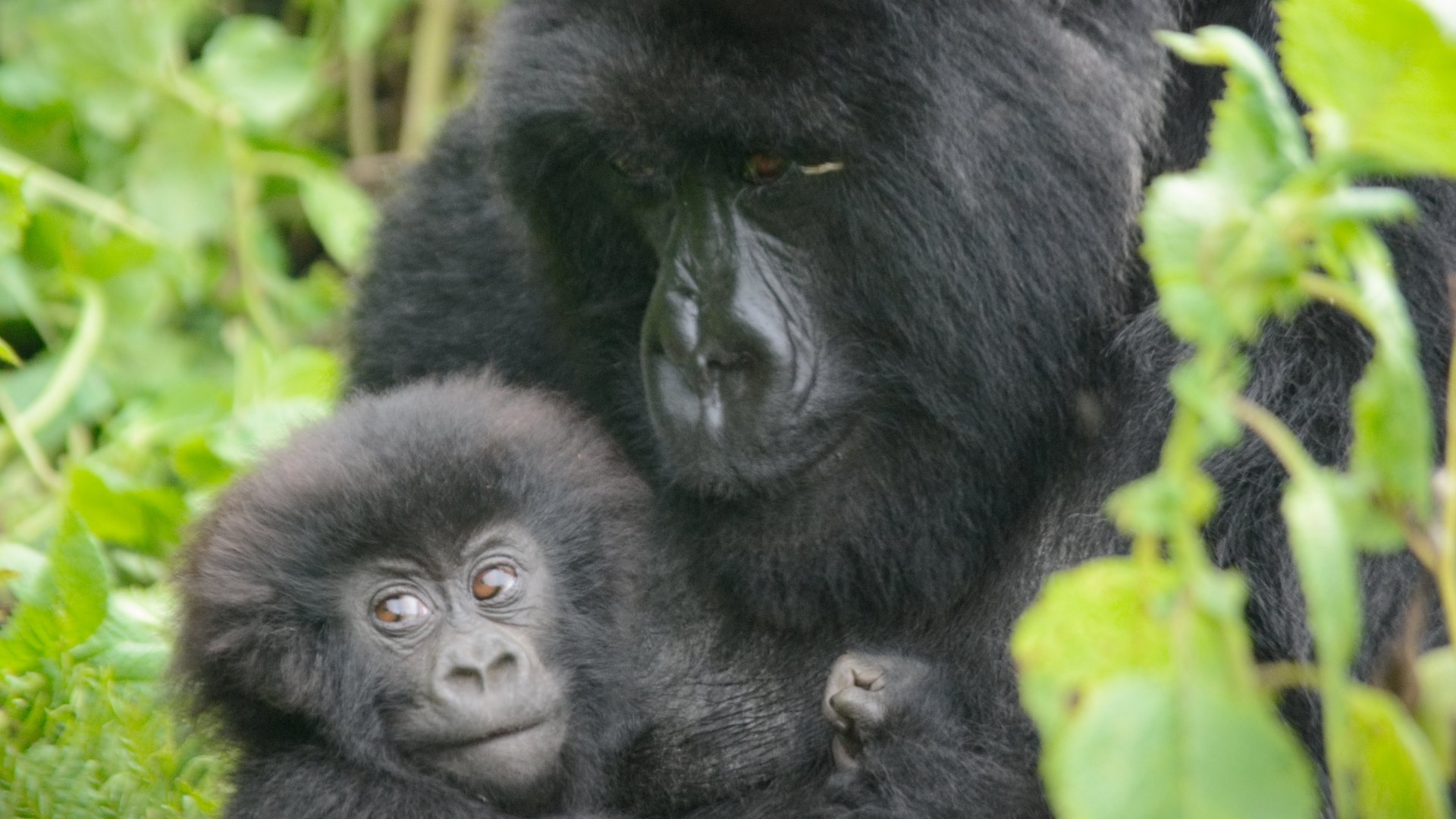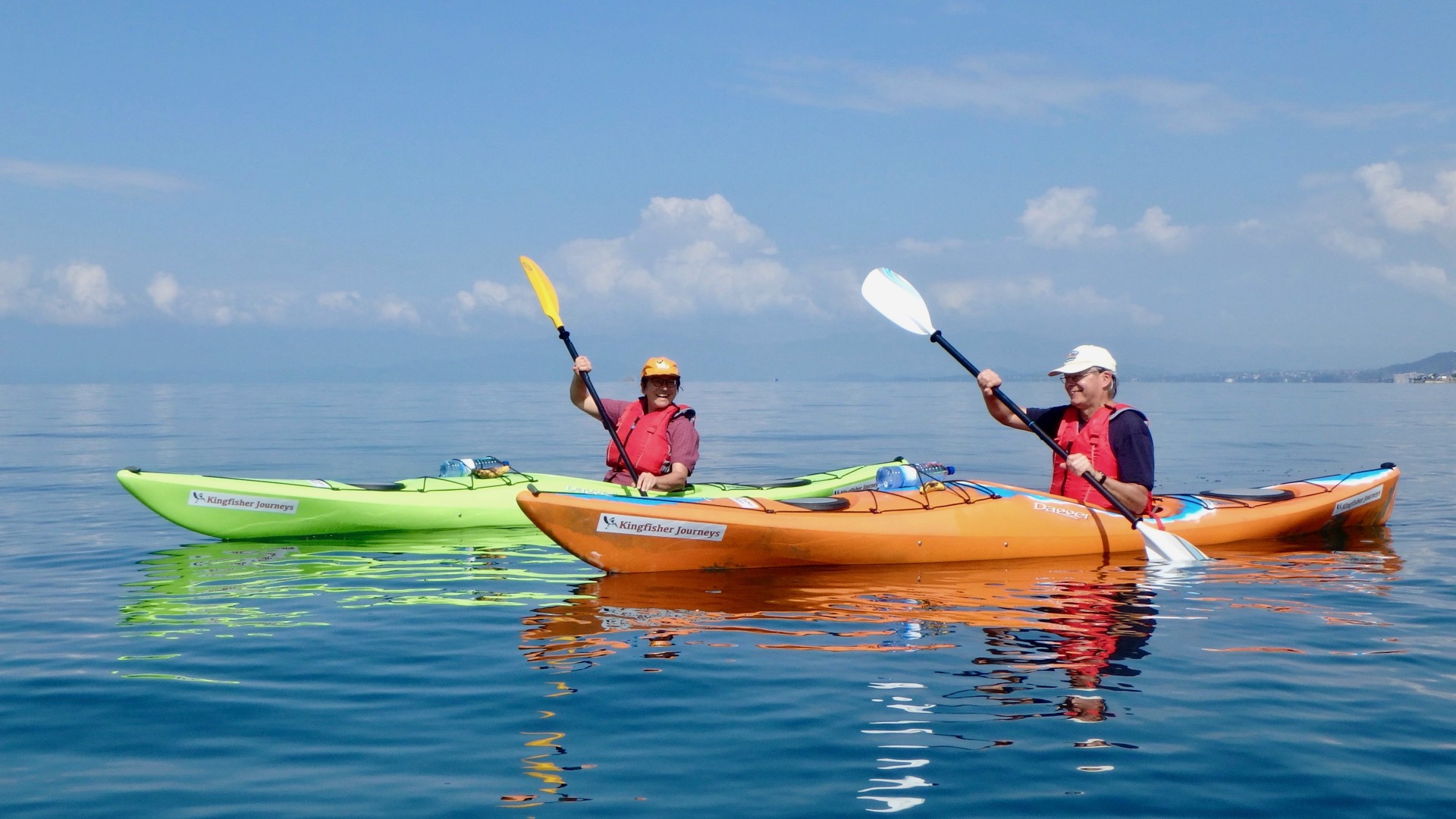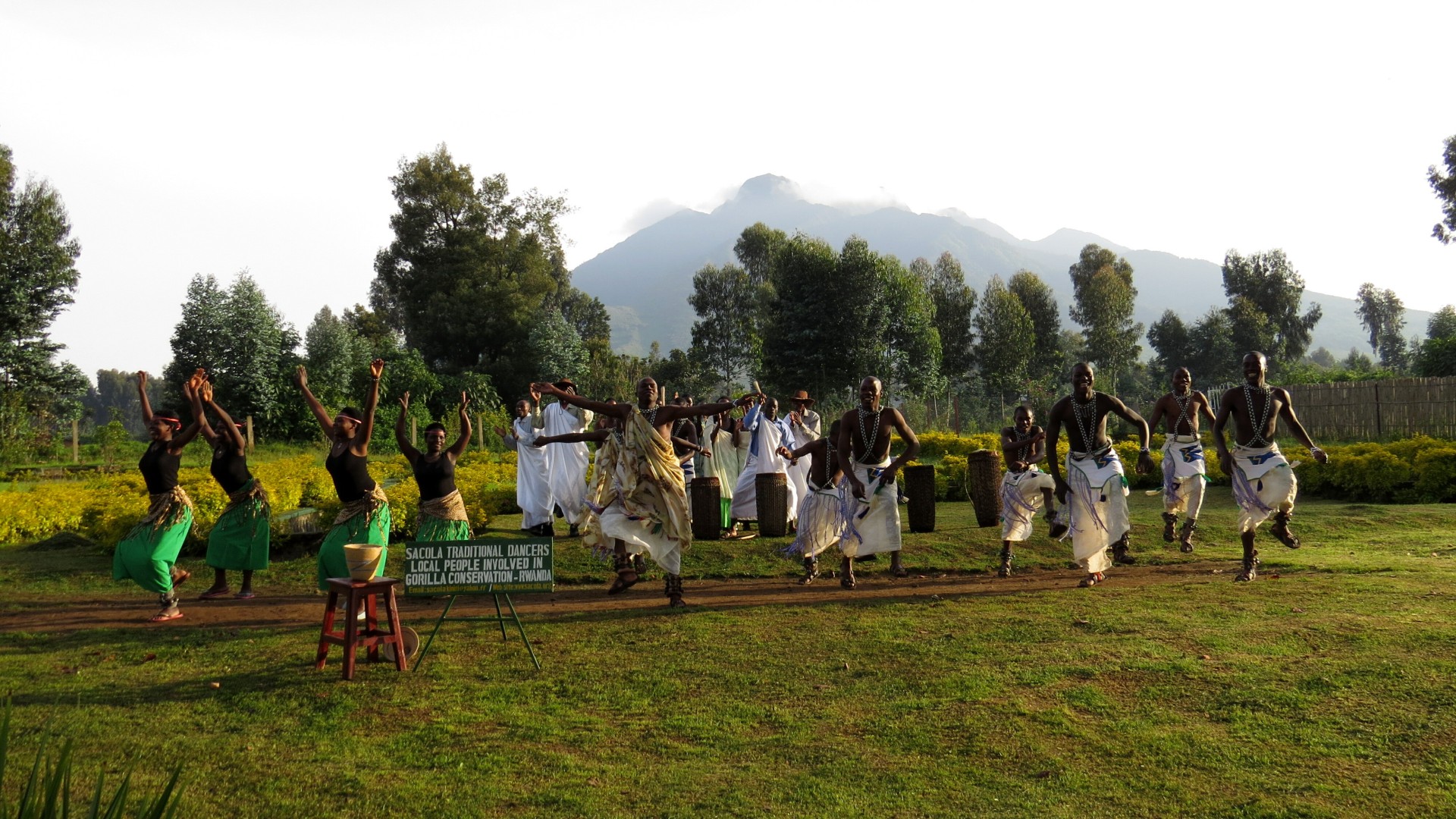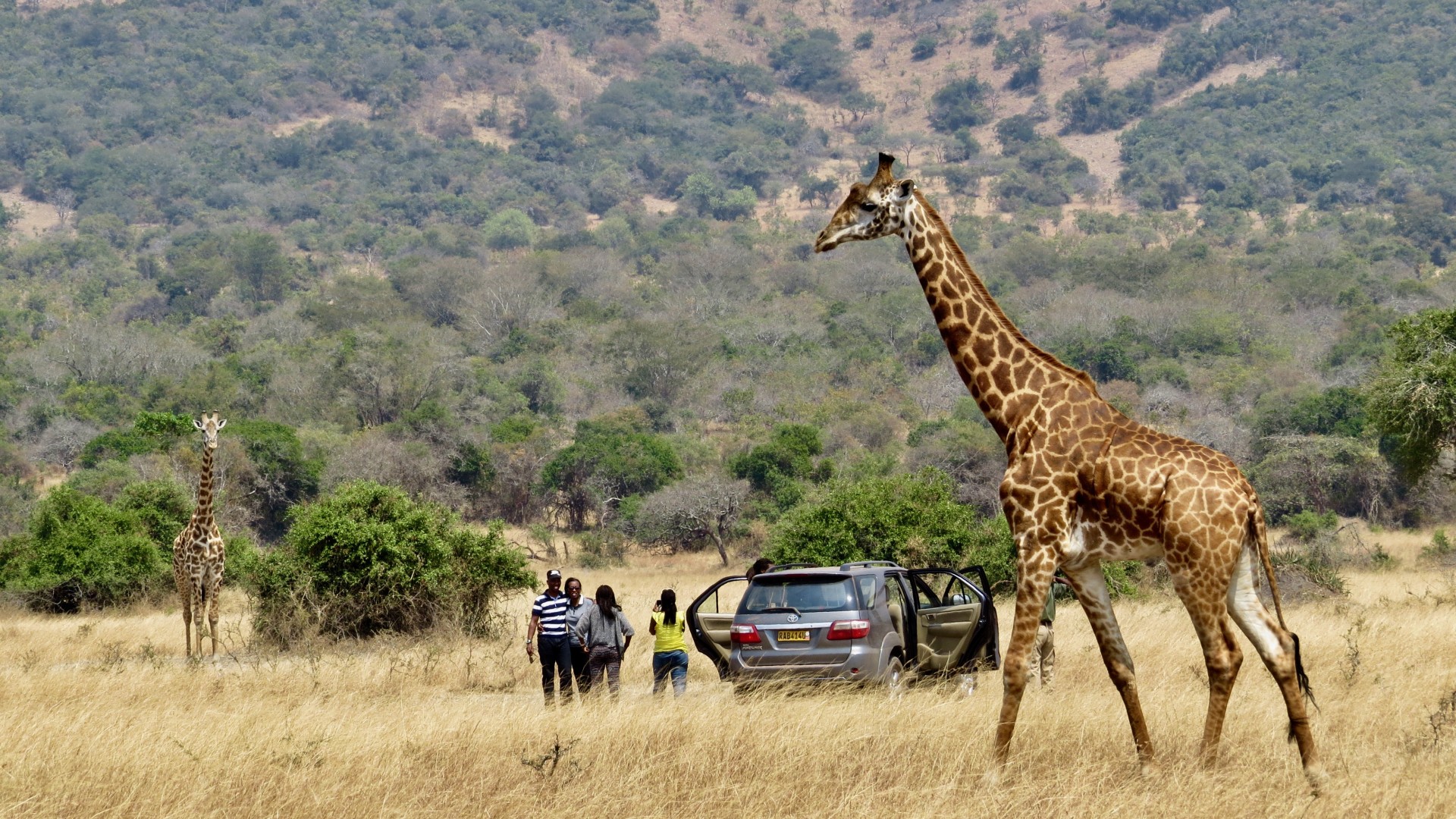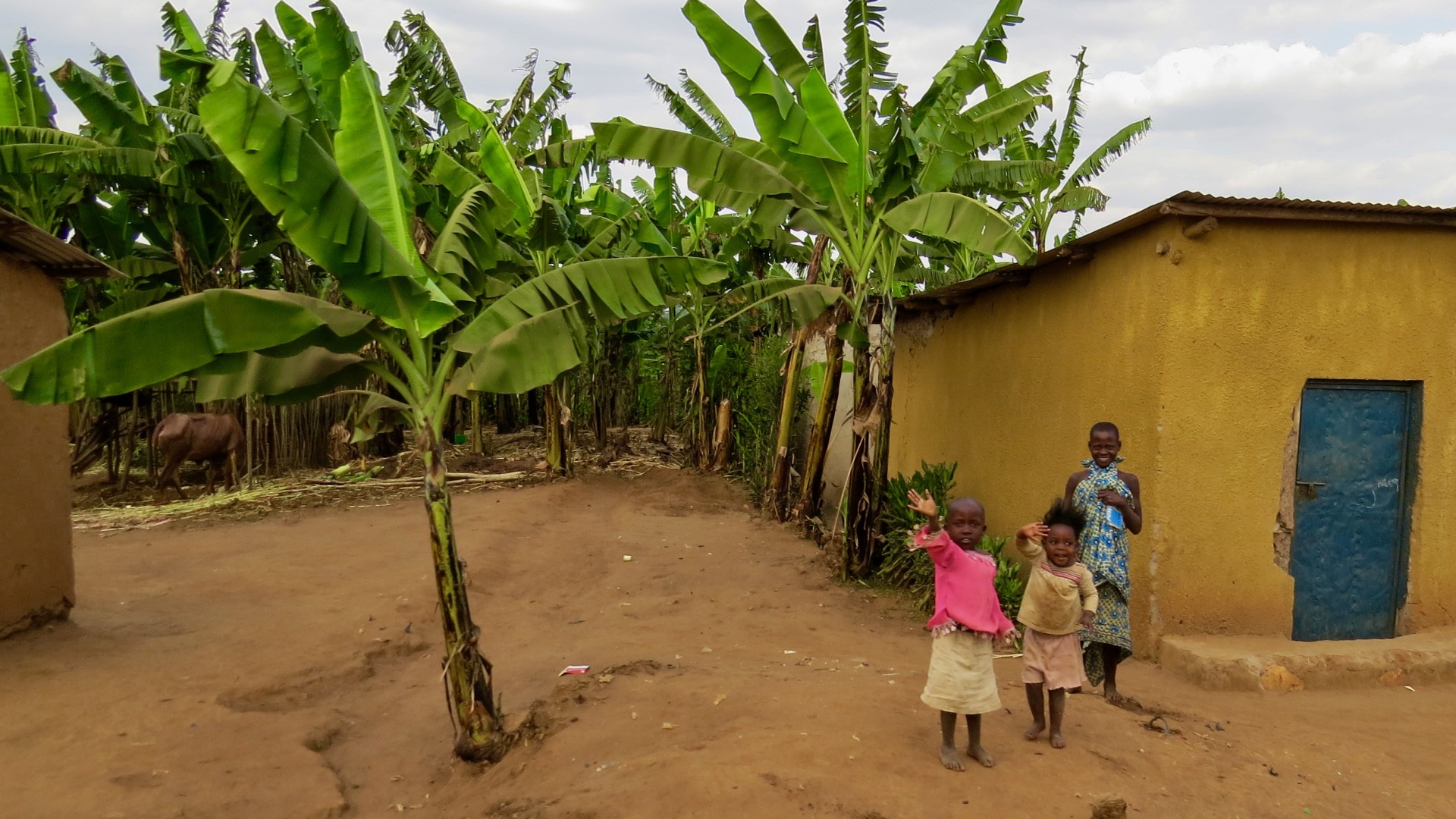Rwanda Gorilla Trekking & Kayaking Adventure
Rwanda is one of Africa’s most enchanting destinations, with breathtaking scenery, wildlife-filled national parks, and a tidy capital, Kigali. It’s also one of the few places on the continent where you can see mountain gorillas in their natural habitat, with these endearing primates inhabiting the slopes of Volcanoes National Park.
But Rwanda also offers classic safari experiences in Akagera National Park where giraffes, elephants, and lions roam free. You can spot hippos on the shores of Lake Ihema before getting up close to chimpanzees and colobus monkeys in Nyungwe Forest National Park. One of Africa’s greatest cycling and hiking routes, the Nile Congo Trail, also traverses the country, taking in the picturesque shores of Lake Kivu.
Through our sister company Sea Kayak Adventures, we offer our spectacular Primates and Paddling Tour that includes 3 days of paddling on Lake Kivu where there are no crocodiles or hippos! One of Africa's largest lakes, this is a magical kayak trip that mixes the culture of the local people, lakeside trails, tranquil waters and forested mountains.
Please note that permits to view the gorillas and golden monkey are highly restricted and in order to improve the chances of obtaining one, please sign up for this trip more than three months in advance. We also design custom trips and if you can't plan ahead at least three months, then these can often be orchestrated so that we visit the gorillas on a day when permits are available.
Trip Highlights
- Explore Nyungwe Forest, home to 310 bird species and 13 primate species, including chimpanzees
- Kayak the pristine waters of Lake Kivu, one of Africa’s Great Lakes, and witness the daily life of local fishing communities
- Meet and interact with welcoming Rwandan villagers for an authentic look into African life
- Camp overnight on a secluded island, enjoying expertly prepared meals under the stars
- Take a behind-the-scenes coffee tour, from harvesting the cherries to roasting the beans over an open fire
- Visit The Ellen DeGeneres Campus of Dian Fossey’s Gorilla Fund, with an insider’s presentation from conservation experts
- Embark on a once-in-a-lifetime trek to observe endangered mountain gorillas and enjoy an unforgettable golden monkey trek (Note that you should sign up for this trip at least 90 days in advance in order for us to secure permits for the gorilla and golden monkey treks.)
Images & Videos
Itinerary
Day 1
Arrival Day
Fly into Kigali and make your way into town where an orientation meeting and group dinner will be held.
Activity today:
- Vehicle Transportation: Drive from Kigali airport to hotel (approx. 30-45 minutes, 7-12 miles / 12-19 km)
- Level of Activity: Easy (No significant physical activity today, just arrival and dinner)
Please Note: Gorilla and golden monkey trekking permits are extremely limited and issued in advance. To ensure access, we recommend booking this trip at least 90 days prior to departure and to ensure the best experience, the order of this itinerary may be adjusted depending on primate viewing permit availability
Day 2
Kigali Day Tour
Overcome any jet lag with a relaxed morning at the hotel, followed by a tour of Kigali. This modern capital city is undergoing a rapid transformation, despite its traumatic past. Visit the Nyamirambo Women’s Center and stroll through the surrounding neighborhood to gain insight into daily life and learn about some of the social enterprises operating here.
Next, pay a visit to the Genocide Memorial, a poignant reminder of the country’s past and a testament to how far it has come. While the exhibits can be confronting, understanding this history is essential for appreciating Rwanda and the people you will connect with along your journey.
Then to the Niya Arts Center, a vibrant space where creativity flourishes through painting, sculpture, dance, music, and drumming. The artists in residence hail from across Africa, offering you the opportunity to experience a diverse array of African art on display.
Activity today:
- Walking: 2-3 miles (3-5 km), approx. 4-5 hours (Exploration of Nyamirambo Women’s Center, Genocide Memorial, and Niya Arts Center)
- Vehicle Transportation: Short drives between sites (approx. 30 minutes each)
- Level of Activity: Easy (Mainly walking through cultural sites, light exploration of neighborhoods)
Day 3
Nyanza King’s Palace and Nyungwe National Park
After breakfast at the hotel, you’ll depart Kigali and drive south to the Nyanza King’s Palace to see a royal residence dating from the 19th century. Learn about the leadership of King Yuhi V Musinga, then continue to the National Ethnographic Museum in Huye to explore what is one of Africa’s finest ethnographic collections. Gifted to the country by Belgium in 1987 to celebrate 25 years of independence, the collection offers a fascinating insight into Rwandan culture, with exhibits related to geology, agriculture, music, and arts.
Refuel during lunch in Huye before continuing west to Nyungwe National Park, which is home to 13 species of primates and a population of around 500 chimpanzees. Established in 1933, the park encompasses two of Africa’s largest rivers - the Nile and Congo - and protects the largest remaining area of montane rainforest in eastern Africa. Nyungwe is a biologically rich region, with hundreds of plant and animal species recorded here, 15% of which are endemic to the Albertine Rift. Aside from chimpanzees, various species of colobus have also been observed within the forest, together with more than 300 bird species, 100+ butterfly species, and five different chameleons.
Activity today:
- Vehicle Transportation: Kigali to Nyanza King’s Palace (approx. 1.5 hours, 50 miles / 80 km)
- Walking: 1-2 miles (2-3 km), approx. 1 hour (King's Palace tour)
- Vehicle Transportation: Nyanza to Huye (approx. 45 minutes, 18 miles / 30 km)
- Walking: 1 mile (2 km), approx. 1 hour (Ethnographic Museum exploration)
- Vehicle Transportation: Huye to Nyungwe National Park (approx. 3 hours, 80 miles / 130 km)
- Level of Activity: Moderate (Includes cultural site visits and a long drive)
Day 4
Nyungwe National Park
Begin the day with a visit to the newly discovered waterfall in Nyungwe National Park. The trail winds through dense jungle, with the sounds of rushing water and calls of wildlife all around. From the high forest, you’ll enjoy stunning views of Lake Kivu and may spot some of the primates that call this area home. At the waterfall, choose between two vantage points — one that offers a closer look if you don’t mind a bit of spray!
Afterward, head to the Uwinka Visitors Centre, where a forest ranger will accompany you on the Igishigishigi Trail’s canopy walkway. Suspended 100-120 feet (30-40 meters) above the forest floor, this 200-meter (656-foot) bridge offers an entirely new perspective of the park. With towering trees below and endless green stretching in every direction, it’s a breathtaking experience. Keep an eye out for some of Nyungwe’s 310 bird species, as well as butterflies, orchids, and perhaps even a curious Colobus monkey peeking through the foliage.
Activity today:
- Walking: 4-5 miles (6-8 km), approx. 3-4 hours (Waterfall hike)
- Walking: 1 mile (1.6 km), approx. 1 hour (Canopy walkway)
- Level of Activity: Moderate to Challenging (Hiking with varying terrain and heights)
Day 5
Chimpanzee Viewing and Lake Kivu
Rise very early for a morning hike to view some of Nyungwe’s chimpanzees with your guide. The trek follows forest paths, and you may encounter steep rainforest slopes along the way. Listen for the loud “pant-hoot” calls of the chimps, often heard before the primates appear swinging through the trees. This distinctive call, used to identify one another through the dense foliage, was famously described by Jane Goodall. You’ll have the chance to observe and photograph these fascinating creatures with whom we share 95% of our DNA.
In addition to chimpanzees, Nyungwe Forest is home to other primates, including Silver Monkeys, Vervet Monkeys, and Olive Baboons. The forest’s incredible biodiversity extends to its birdlife as well, so keep your eyes peeled for colorful species as you explore.
After your chimpanzee trek, we’ll drive for a couple of hours to the stunning shores of Lake Kivu. Surrounded by blue-hued mountains and lush greenery, this lake is one of the deepest freshwater lakes in the world and a popular kayaking destination. Unlike many other lakes in Africa, Lake Kivu has no hippos or crocodiles. The lake’s steep, rocky sides prevent them from climbing out to graze or bask in the sun, so there are no surprises on the water.
At the hotel, you'll receive a kayaking orientation and safety talk, followed by a leisurely paddle on the lake as the sun sets, offering a perfect end to the day.
Activity today:
- Trekking: 3-4 hours, moderate difficulty, 2-3 miles (approx.) (Chimpanzee trek)
- Vehicle Transportation: Nyungwe to Lake Kivu (approx. 2 hours, 60 miles / 96 km)
- Kayaking: 1-2 hours, easy to moderate, 2-3 miles (approx.)
- Level of Activity: Challenging (Trekking through dense forest and kayaking on Lake Kivu)
IMPORTANT NOTE:
Chimpanzee trekking permits are extremely limited and must be arranged well in advance.
For bookings made 90 days or more before departure, permits can be secured.
For bookings made less than 90 days before departure, permits are not guaranteed. In that case, every effort will be made to obtain them, and a meaningful alternative activity will be arranged if needed.
Day 6
Lake Kivu
Once ready, we’ll begin our paddle north along the stunning shores of Lake Kivu. As we journey, we’ll stop along the way whenever something catches our interest, allowing you to fully appreciate the beauty of the surroundings. A picnic lunch will be served, adding to the experience, all while being accompanied by spectacular scenery.
Activity today:
- Kayaking: 8 miles (13 km), approx. 5-6 hours (Paddling along the shore)
- Vehicle Transportation: Short transfer to kayak starting point (approx. 30 minutes)
- Level of Activity: Moderate (Continuous kayaking along the lake shore with breaks)
Day 7
Lake Kivu’s “Bay of Islands”
Today will be spent paddling along the shores and between the islands of Lake Kivu, keeping our eyes peeled for African fish eagles, monkeys and Congo clawless otters. We’ll stop for lunch on one of the islands and embark on a short walk to its summit for panoramic views across the lake.
In the late afternoon, we’ll arrive at our island camp, which will be prepared for our arrival and allows you to be immersed in the lake’s tranquility. A highlight of the evening will be paddling out into the lake to hear the fishermen singing, with their voices resonating across the water.
Activity today:
- Kayaking: 5 miles (8 km), approx. 3-4 hours (Paddling along the lake)
- Walking: 2-4 miles (3-6 km), approx. 1-2 hours (Island exploration, hill walk)
- Level of Activity: Moderate (Kayaking and walking through hilly terrain)
Day 8
Paddle North to Kinuni
Begin the day with a short paddle along the shores of Lake Kivu before arriving in time for lunch at our lodge. The afternoon will be spent walking with a local guide who will introduce us to some of the nearby villages and their inhabitants to learn about life in Rwanda.
Activity today:
- Kayaking: 5 miles (8 km), approx. 2-3 hours (Short paddle)
- Walking: 2-4 miles (3-6 km), approx. 1-2 hours (Village exploration)
- Level of Activity: Moderate (A mix of easy kayaking and walking)
Day 9
Kayaking to the Village of Cyimbili and Coffee Plantation Tour
Begin our final day of kayaking by paddling to the small village of Cyimbili, perhaps stopping in the market village of Nkora along the way. Originally established as a planned community, Cyimbili has now become a hub for coffee plantations, with the opportunity to learn about the process on a tour of one.
After a village lunch, we’ll return to the lake for a motorboat transfer to the northern end of Lake Kivu. Here we’ll base ourselves in the lovely fishing village of Rubona, a satellite settlement of bustling Gisenyi, which has become a popular resort area. Enjoy an evening stroll around the village, with the opportunity to mingle with the locals in one of the breweries.
Activity today:
- Kayaking: 7.5 miles (12 km), approx. 3-4 hours (Paddling to Cyimbili)
- Walking: 1 mile (1.6 km), approx. 1 hour (Coffee plantation tour)
- Level of Activity: Moderate (Includes kayaking and a short walk)
Day 10
Musanze and Dian Fossey’s Karisoke Research Center
We’ll depart our beach resort in the morning for the 1.5-hour drive to Musanze, Rwanda’s third-largest city and the gateway to Volcanoes National Park. Situated at 6,000 feet (1,850 meters), it features a dramatic, mountainous backdrop and a pleasant climate. We’ll visit an inspiring weaving project called Handspun Hope where marginalized women have found employment producing woven art, then refuel over lunch.
In the afternoon, we’ll visit the Karisoke Research Center to learn about the work of Dian Fossey, as well as ongoing gorilla conservation and research. See manuscripts and diaries from her early days spent researching the gorillas, then learn about the lives of gorillas and their biology during a special presentation.
Activity today:
- Vehicle Transportation: Lake Kivu to Musanze (approx. 1.5 hours, 45 miles / 72 km)
- Walking: 2-3 miles (3-5 km), approx. 2 hours (Handspun Hope and Dian Fossey Campus visit)
- Level of Activity: Easy (Site visits with short walks)
Day 11
Morning Walk to See Golden Monkeys - Afternoon Hike at Lake Ruhondo – Lakeshore Lunch
Rise early and prepare for our morning trek to see golden monkeys, an endangered species that is native to Africa. Witness these agile forest dwellers swinging through the forest canopy and perhaps even walking right by us along the ground.
Around noon, we’ll return to our lodge for lunch before embarking on a short walk around the shores of Lake Ruhondo. Watch the fishermen on the lake and spot birdlife while chatting with locals along the way. Once you’ve had enough, a motorboat will pick the group up for a late afternoon cruise to soak up the scenery, which includes views of all five Virunga volcanoes.
Activity today:
- Trekking: 2-3 miles (3-5 km), approx. 2-3 hours (Golden monkey trek)
- Walking: 3-5 miles (5-8 km), approx. 2-3 hours (Lakeside walk)
- Level of Activity: Moderate (Includes trekking and a lakeside walk)
Day 12
Tracking the Mountain Gorillas and Return to Kigali
Our day begins early at the headquarters of Virunga Volcanoes National Park where we’ll start our trek to see Rwanda’s mountain gorillas. Numbering around 1,000 individuals in total, there are approximately 500 living in Uganda’s Bwindi Impenetrable National Park and 500 in the Virunga Volcanoes area, which straddles the border between Rwanda and the Democratic Republic of the Congo. These peaceful primates spend much of their day on the forest floor and trackers will radio ahead to notify our guides of their approximate location.
You’ll spend an unforgettable hour with the gorillas, with time limits imposed to protect the troupes from habituation with humans. Mountain gorilla tourism provides a vital role in their conservation, however, as without the funds it generates, there may not be any of these primates left in the world.
Upon our return to the park headquarters, we may visit a community project called the Gorilla Guardians Village before returning to Kigali where your guide will drop you at your hotel for a celebratory lunch.
Activity today:
- Trekking: 2-3 miles (3-5 km), approx. 3-4 hours (Mountain gorilla trek)
- Vehicle Transportation: Musanze to Kigali (approx. 2 hours, 60 miles / 96 km)
- Level of Activity: Challenging (Includes an intense trek to see mountain gorillas)
Note: The permits to view the gorillas and golden monkeys are highly limited and this trip should be booked a minimum of three months prior to departure date. Once we are within a three month window please contact us to discuss permit availability.
Day 13
Free Day in Kigali
After breakfast at the hotel, it’s time to transfer to the Kigali International Airport for your flight home or onward travel.
Activity today:
- Free day in Kigali. No formal activities.
- Level of Activity: Easy (Leisure day with no physical activity planned)
Dates & Rates
| Dates | Adult (USD) | Child (USD) |
|---|---|---|
| 2026 | ||
| Jun 14, 2026 to Jun 26, 2026 Guaranteed Departure & Lowest Tier Pricing | $9,600£0€0$0$0 | $9,600£0€0$0$0 |
| Jul 19, 2026 to Jul 31, 2026 Lowest Tier Pricing | $9,600£0€0$0$0 | $9,600£0€0$0$0 |
| Nov 08, 2026 to Nov 20, 2026 Lowest Tier Pricing | $9,600£0€0$0$0 | $9,600£0€0$0$0 |
| Dec 21, 2026 to Jan 02, 2027 Lowest Tier Pricing | $9,600£0€0$0$0 | $9,600£0€0$0$0 |
Supplementary Information
Pricing
2025: Tiered pricing based on group size.
- 10 - 14 guests: $9,280 per person
- 4 - 9 guests: $9,600 per person
- Single supplement: $790
2026: pricing same as 2025!
- 10 - 14 guests: $9,280 per person
- 4 - 9 guests: $9,600 per person
- Single supplement: $790
Tiered Pricing Explained
Our trips are budgeted for full or near-full sign-ups, which enables us to offer trips at the lowest possible price. Because of numerous fixed costs, it is more expensive to operate a trip for a small group. Therefore, on some of our trips, we use a tiered pricing system to avoid canceling a trip with a low number of sign-ups. We have found that most people also prefer this alternative to having a trip canceled.
Thus, you will note on our trip prices that there may be different rates for groups of 4-9 versus 10-14. We may initially invoice you at the higher tier price and refund the difference depending on the final group size. Trip costs are quoted based on foreign exchange rates current at the time of this printing. We reserve the right to raise the trip fee if there are exceptional cost increases beyond our control. Prices are based on double occupancy. If desired, we will strive to pair you with another single guest to eliminate the single supplement fee; however, please note that this is not always possible.
Departures
Alternative dates are available. Please contact us for more information.
Not Included:
- International travel insurance (compulsory),
- International flights
- Visa fees ($50 fee payable on arrival at the Kigali airport).
- Drinks beyond water such as soda, beer, or other alcoholic drinks
- Items of a personal nature such as laundry, miscellaneous tips when you are on your own,
- Memorial photography fees, medical evacuation or treatment costs apart from helicopter evacuation to Kigali, international calls, any hotel mini bar and Wi-Fi charges applicable.
- Permit fees for the gorilla trek
- Permit fee for golden monkey trek
Permits:
- 2025 Gorilla Trek Permit - $1500 (2026 pricing subject to change)
- 2025 Golden Monkey Permit - $100 (2026 pricing subject to change)
Included:
- One group airport transfer is included on the official start date of the trip. Additional transfers for early arrivals can be arranged for an extra cost.
- Private transfers with a knowledgeable English-speaking driver guide
- Qualified, experienced, English speaking and government-registered activity leaders in various locations
- All accommodation
- All meals except as indicated
- National Park entrance fees and National Park guides
- Single kayaks for the duration of the activity
- Qualified, experienced, English speaking paddlesport leaders
- Camping equipment for the one-night camp on the island, including three-person tents (sleeping two), sleeping pads, camping pillows and (optionally) sleeping bags
- Helicopter emergency medical evacuation service insurance policy within Rwanda (compulsory)
- All drinking water from reusable containers* (Except where unavoidable, single use plastic bottles will not be used, so all group members must carry at least two 1-litre reusable or filter water bottles. A filter water bottle works especially well whilst kayaking as the water in Lake Kivu is safe to drink after filtering or treating. Filter suggestions will be provided.)
- All Local taxes
FAQ & More
Do I need to book early to see the gorillas, chimps and golden monkeys?
Yes. Rwanda strictly limits the number of daily trekking permits to protect the animals and their habitat. These permits often sell out well in advance—especially during peak seasons. To guarantee your spot, we require bookings at least 90 days before your intended travel date. This ensures we have time to reserve your permits and finalize arrangements with the national park authorities.
What permits do I need, and how much do they cost?
A gorilla trekking permit is required and costs $1,500 per person (2025) for a one-hour visit with the gorillas in Volcanoes National Park. Permits should be booked well in advance, as availability is limited. The fee helps support conservation efforts and local communities. (*The one-hour visit is the time allotted once the group arrives at the site where the gorillas are located. Hiking to the location where the gorillas are could be as short as a one hour hike, or sometimes entails a two-three hour hike each way. Because there are numerous families of gorillas that have been habituated to human presence, the local guides do their best to take each group to a gorilla family that is located within range of the group's abilities.)
How difficult is the gorilla trek, and do I need to be very fit?
Gorilla trekking can range from moderate to challenging, depending on the location of the gorilla family you are assigned to visit. The hike may involve steep, muddy trails and dense vegetation, lasting anywhere from 1 to 5 hours each way. While a good level of fitness is recommended, porters are available to help carry bags and assist along the way.
What are the chances of seeing gorillas?
On the gorilla trek or gorilla safari that we do, there is an almost certain opportunity to see gorillas. In Volcanoes National Park there are currently 10 habituated groups (family units that have become accustomed to being around humans).
They can be within a half hour walk of the Park Headquarters, or 2-3 hours away. Usually we walk somewhere between 1-2 hours to reach our assigned family group. However, as the gorillas do move, it could be longer. The Park tries to send groups of people that are more fit to the troops that are farther away, and groups desiring less walking or hiking to those closer.
What’s the best time of year to visit Rwanda?
Rwanda is near the equator, so temperatures stay fairly consistent year round and can be considered pleasantly warm. Generally they range from 80-81 F during the day and 52-55 F at night. In the mountains, particularly in Volcanoes National Park, it is cooler while it can be warmer in the far west due to lower elevation.
There are also seasonal rainy and dry seasons in Rwanda. There is a short dry season from December to February. This is followed by a rainy season through May. Then June to mid-September is a longer dry season. This is followed by a rainy season in October and November.
Bear in mind there is no perfect science here and also that even during the rainy season the rains typically don’t last long and are often in the afternoon. To learn more visit: https://www.climatestotravel.com/climate/rwanda
What is the currency of Rwanda?
The official currency is the Rwandan Franc.
Is English spoken?
English is the second language in Rwanda and many people in the cities and tourism enterprises speak English. In small villages it is much less common.
How does the mountain gorilla trek operate?
The opportunity to see the gorillas is managed by the Rwandan National Park system. Permits are limited and purchased in advance. The permit allows for one hour of actual viewing time with the gorillas. This is in addition to the time required to hike to and from the gorilla troop. The day starts early at Park headquarters where we are assigned a guide and are divided into groups of no more than 8 people. After a short orientation meeting we drive to whatever location is closest to the gorillas. Then we walk between a half hour and 2-3 hours to reach the gorillas. Once we arrive at the location of the gorillas, the one-hour clock begins. The guides instruct us where to move and stand as we observe these impressive animals. There is plenty of opportunity to take photographs.
Are the mountain gorillas dangerous?
Gorillas are wild animals and thus to a certain degree, are unpredictable. However, the Park rangers spend several years habituating each troop to be used to human visitors. Some of the groups have been habituated for over 10-15 years. Young gorillas born into a habituated troop are immediately habituated as they observe their troop interact with humans. It is critical to follow the instructions and directions given by the guides and do as they say when we are near the gorillas (and other times as well).
What are the golden monkey and other primate walks like?
The other primates we observe on this trip (chimpanzees, golden monkeys, black and white colobus and others) are wild animals that move freely in their forest environment. In each case we have to walk or hike to their location. In some cases, they are on the move and we may not get very close. In general, they are much more active and mobile than the gorillas. Local Park guides do their best to provide the best possible viewing.
What other wildlife will we see?
There are many birds in Rwanda, some of which are endemic to the area, and we see a number of these during our trip. Outside of the National Parks there are few wild animals. Classic African animals can be found at Akagera National Park. (see below)
Can I see the Big Five in Rwanda?
Yes! We offer an extension to our main tour to visit Akagera National Park in the east of Rwanda along the border with Tanzania. The Big Five live here! You can see lions, elephants, Cape buffalo, rhinoceros, and leopards. Giraffes, zebras, and antelopes are also abundant, with species including Klipspringer, eland, impala, Defassa waterbuck, common duiker, bushbuck, and sitatunga. In the lakes, there are hippos and crocodiles.
However, Lake Kivu is different—there are no hippos or crocodiles due to its steep, sandy shores, which make it impossible for them to climb out.
There are also baboons, monkeys, and warthogs in Akagera. Other species, such as genets, civets, aardvarks, porcupines, bush babies, and elephant shrews, can only be seen at night.
Why should I travel with Adventure Unbound in Rwanda?
We personally research all our destinations with a goal to design unique itineraries you won’t find anywhere else. Our Paddling & Primates trip is the only trip that combines primate viewing, a gorilla safari and kayaking on Lake Kivu. We choose locally-run, unique accommodations and eat in interesting, locally-operated restaurants. We know our guides and drivers personally and they in turn know our guest expectations. We do not use high-end accommodations, so our tour is an excellent value for those focused on having an authentic, wildlife-rich active vacation.
Can I do a private trip in Rwanda?
Yes, we are happy to accommodate groups as small as 1 and as large as you may wish to travel to Rwanda. If our itinerary isn’t what you are looking for we can custom design any tour you might wish.
Can I combine gorilla watching in Rwanda with other gorilla destinations?
Mountain gorillas are found in Rwanda and Uganda. A number of operators offer tours that combine Rwanda and Uganda and we too are happy to design a custom tour, or an extension to our tour, should you wish to visit the gorillas in other countries.
What is the food like in Rwanda?
The food on our trips is locally prepared and delicious. In Kigali there are some very innovative restaurants while those in the countryside and smaller cities are more basic. Meals consist of various ingredients including fish, meat, vegetables, nuts and tropical fruits. Typical items on menus include beans, bananas, fried plantains, sweet potatoes and cassava. There is also Umutsima which is a dish of cassava and corn, and isombe (cassava leaves with eggplant and spinach). Brochettes of lamb, goat and fish are common. A delicacy from Lake Kivu are tiny fish called Sambaza that are deep-fried.
Is there malaria in Rwanda?
There are some regions in Rwanda where mosquitoes that carry malaria are present. Check with your personal physician and the CDC website for details on any precautions you may want to take. It’s always wise to wear long sleeves, long pants and socks in the late afternoon/evening when mosquitoes are most likely to be active.
Is Ebola a concern?
In 2018-19 another Ebola outbreak occurred in the DRC. A very few cases have crossed the border into either Uganda or Rwanda. A successful vaccine has been developed and is now in use which is changing the situation dramatically. Traveling to this area of the world is a personal choice based on your own risk tolerance.
Can I drink tap water in Rwanda?
We recommend that you drink only filtered water. We ask you to bring a water bottle and we provide clean drinking water dispensed from large containers. Of course, there are many other beverages available including soft drinks, tea, coffee, beer and wine.
What are good souvenirs from Rwanda?
You will find a wide variety of handmade souvenirs and crafts are available. On our tour we visit a couple of women’s foundations that make and sell crafts including woven items, textiles and art.
Should I bring gifts for the local people I meet?
Rwanda is a poor country and gifts are much appreciated. While we include incidental tips on our tours, tipping hospitality servers and providers is always welcome and an effective way to help people. Items from your home town such as postcards, or a small picture-book of your home region can be a good conversation-starter and fun gift to connect with people. Memory sticks are always appreciated. Please do not bring cheap plastic things, or things that would require batteries as these are expensive for people.
GRATUITY GUIDELINE
Other tips are not included in the cost of your adventure. Tipping is purely discretionary, however if you would like to show your appreciation, we recommend $10 - $20 per guest per day for lodge/camp staff, paid in the communal tip box at reception. For guides, we recommend $10-$15 per day, paid directly to the guide. All tipping is in US dollars. Porters are best paid in local currency at the equivalent of $1 per piece of luggage carried. (Posted: April 2025)
What type of outlets are in Rwanda?
Power outlets in Rwanda are a mix of Type C (Europlug) and Type G (UK). Most hotels also have US-compatible sockets. However, the electricity supply is always 230V, 50Hz.
Should I tip guides and drivers?
You will have a main driver/guide with you during the day at all times during the trip except when kayaking. During those days, you will have a kayak guide. There will be many other staff that come and go along the way. On the primate treks, there are “trackers” that go out early in the morning to find the animals. They then communicate this information to the “Park Guide” and/or “Rangers” who will be hiking with you. At some point, usually at the end of the trek, this entire group of people will be present to say goodbye. This is the time to offer them a gratuity as outlined below. The “Park Guide” will return with you to the start of the trek and can be tipped when you say goodbye to them. While this may seem a bit like “nickel and diming,” we have no other good way to coordinate this. Tipping is totally at your discretion. However, remember that the animals in the forest are surviving because tourism has created an economic benefit that exceeds poaching, hunting for bushmeat, clear-cutting the forest, etc.
During the gorilla trek, there are men who offer to carry your daypack. Even if it is small and light, we recommend that each couple hire one of these to support the local community. The normal gratuity for them is around $10-15 per person, with an additional tip of $5 appreciated for excellent service.
Activity guides (kayak guides): $10-20 per person per day
National park guide: $10-20 per person per trek
Ranger: $10-20 per person per trek
Trackers: $5 per person per tracker
Hotel/lodge staff: $10-20 per person per day – more at more upscale places as you see fit
Driver/guide: $10-20 per person per day (Tipped on return to Kigali at end)
Note that when you go to Akagera National Park, you will have a new guide/driver from the lodge, so you will be saying goodbye to your main guide/driver at the point you leave Kigali for the national park.
(Posted: April 2025)
Do I need any vaccinations to visit Rwanda?
Please speak to your travel clinic and look at the CDC (Center for Disease Control) website, for advice on tropical diseases that are found in Rwanda.
Important note about Yellow Fever:
Yellow Fever is possible in Rwanda so to prevent it becoming re-established, proof of having been vaccinated is mandatory for travellers coming from any country at risk of Yellow Fever (or after visiting a neighboring country on the same trip). Thus whilst visitors arriving directly from Europe, USA and Canada may not need to show a Yellow Fever certificate on arrival, you must have a Yellow Fever certificate if you visit a neighboring country on the same trip.
When kayaking on Lake Kivu, which is fresh water, there could be, in theory, a parasite that can cause schistosomiasis. There is no vaccine or prophylaxis for this. We consider the risk to be low, and the main precaution is to not swim in the shallow water near shore.
Should you become unwell after your visit to Rwanda, explain to your doctor where you have travelled and the activities you have taken part in so that they can advise the correct treatment. The treatment for schistosomiasis is a short course of a tablet called Praziquantel, which the World Health Organisations describes as “effective, safe, and low-cost”
How can I give back to the local community there?
During your visit to Rwanda you will come across many amazing people and places. It is an incredible country. We visit a couple of non-profit cooperatives along the way, and buying things from their gift store is a great way to give back and support them. Or you can simply offer a donation.
Other great organizations are Doctors Without Borders and Oxfam, both of which work in Rwanda. It is much better to give to an organization that understands the needs of community and has long-term goals, so we ask you not bring or give gifts of money or any other items to local people except as noted above. Especially do not give things to children.
What do I need to pack?
You can refer to the packing list under 'Packing and Trip Details" tab to the left of this page and we send you a detailed packing list prior to your adventure with us.
Generally speaking, quick-drying synthetic clothing is best.
Good footwear for walking is essential.
What are your Terms and Conditions?
Please see our full Terms & Conditions HERE.


